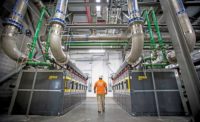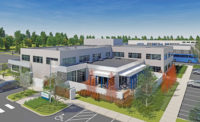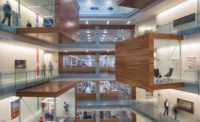Eventful seems almost too mild a word to characterize 2018 for Consigli Construction Co., ENR New England’s Contractor of the Year. Transforming into a 100% employee-owned enterprise, the 114-year-old Milford, Mass.-based contractor and construction management firm reported $1.09 billion in regional revenue, placing it third among ENR New England’s Top Contractors list. The firm ranks in the Top 60 in ENR’s national survey. Consigli also became an early adopter in 2018 of innovative wearable robotic technologies to improve worker health and safety and contributed to 25 children’s health and education charities in the region, via the Consigli Foundation.
CEO Anthony Consigli, the great grandson of immigrant mason Peter Consigli, who founded the company in 1905, says that while the current construction market “has made a lot of contractors look good,” the roots of recent success go much deeper. “I bring it back to our culture, which has been pretty consistent over the years,” says Consigli, 52, who, along with his brother Matthew, 46, the firm’s president, took the company reins in 1995. The brothers oversee a 1,000-person organization with seven offices from Portland, Maine, to Washington, D.C. In addition to striving for continuous improvement and accountability, he adds, “our people work incredibly hard, and I think that gets recognized by our clients and partners.”
“Labor is so scarce now, and tools like these help reduce strains on those workers we do have.”
– Stacey Harris, Superintendent, Consigli
Consigli says being the largest self-performing construction manager in New England also helps, particularly given the large number of schedule-sensitive assignments that require a high level of quality and detail. “Having more than 350 tradespeople at our disposal to make sure those demands are met is a valuable resource,” Consigli says. “It also helps us stay close to the practice of construction itself because we fashion ourselves as a true builder.”
A builder’s mind-set also contributes to Consigli’s knack for tackling some of the region’s most technically challenging renovations. In 2018, for example, the firm completed Harvard University’s Smith Campus Center renovation and facade restoration, repurposing a mid-20th-century structure designed by Spanish architect Josep Lluís Sert. At Boston’s Congress Square, Consigli added a seven-story glass addition atop a building complex comprised of five interconnected historic commercial buildings that span an entire city block.
A commitment to accommodating complexity is part of Consigli’s DNA, says Boston architect and longtime project partner William Rawn of William Rawn Associates. “I think they enjoy working with highly sophisticated clients and solving problems,” says Rawn, who teamed with Consigli for the new four-building complex of rehearsal, concert and event spaces at the Tanglewood Music Center in Lenox, Mass.
Consigli is among the regular CMs David Flanagan, senior director of capital facilities for Beth Israel Deaconess Medical Center in Boston, uses for his $100-million annual building program. He says the current multiphased reconfiguration of the emergency department illustrates Consigli’s ability to cope with complexity. Although the project calls for significant and repeated changes to work flows, from new entrances for ambulances and ambulatory patients to nearby clinical and laboratory spaces, Flanagan says collaboration with Consigli “has helped us maintain our functionality because we can’t close our operations for a minute.”
Testing Technology
Flanagan also considers Consigli a “technologically forward-thinking company” that understands the nuances of planning and carrying out construction amid complicated medical systems. “That’s about as challenging an environment to build in as there is,” he says, noting that Consigli also has invested significantly in modeling and planning tools that integrate construction aspects with the procurement of advanced medical equipment.
Consigli cautions that technology can be “a double-edged sword,” detracting from interpersonal skills essential for successful relationships and project teams. “We look at it as a tool, one that has to offer a benefit to our clients,” he says.
In 2018, Consigli began using a robotic exoskeleton, a wearable metal framework fitted with motorized “muscles,” for use with repetitive tasks that involve heavy tools, such as masonry repointing. Another robotic tool, the EkoBionics ZeroG Arm, can be worn or attached to staging or a boom lift. According to the Association of General Contractors and EkoBionics, Consigli is the only construction manager currently utilizing this technology in the building market.
The devices help alleviate the stresses of long, repetitive tasks performed at unusual angles by bearing the weight of heavy tools. “Labor is so scarce now, and tools like these help reduce strains on those workers we do have,” says construction superintendent Stacey Harris, who hopes to utilize the technologies on a 65,000-sq-ft science building underway at Bates College in Lewison, Maine. “Innovation is something we excel at.”
As with many other contractors, Consigli also is expanding its use of offsite, multitrade prefabrication as well as preassembling area-specific materials into kits to minimize jobsite clutter.
Another decision that Harris says helps to illustrate Consigli’s values was last year’s implementation of an employee stock ownership plan. “Demonstrating this kind of commitment to its employees,” she says, “sets Consigli apart from other companies in the area.”
Several years’ worth of “Best Places to Work Awards” presented to multiple Consigli offices attest to that as well. But while the company makes a point of offering incentives and rewards to its workforce, Anthony Consigli considers consistent operational excellence to be the most important factor in sustaining employee satisfaction.
“People want to go to work every day with really good people and solid processes, where they know we’re doing everything possible to set them up for success,” he explains. Otherwise, “it’s not going to be a great place to work.”
Consigli, whose daughter, Christina, is a project manager in the firm’s New York office, says that the firm’s future was on executives’ minds as they crafted the ESOP plan. But from a continuity standpoint, Consigli adds, nothing was more important to him and Matthew than ensuring present and future employees have all the tools and resources they need. “Construction is a difficult, challenging business, one where everybody competes hard,” Consigli says. “We wanted to arm ourselves with every possible tool we could to be as strong as possible. The ESOP is a just another way to get stronger.”
Among Consigli’s High-Profile Regional Projects:
Innovation Square
Boston
The first phase of the 360,000-sq-ft life-science research and development complex in Boston’s Seaport District includes a four-story, 125,000-sq-ft building anchored by a two-floor, 54,000-sq-ft office for lead developer Mass Innovation Labs. Campus amenities will include a collaboration center, fitness center, interior bike storage, ample parking with electric-vehicle-charging stations, green space and an onsite transit stop.
St. Gabriel’s Monastery and Church
Boston
The 69,000-sq-ft gut renovation of the landmark facility built in 1909 includes the restoration of all historic architecture, including plaster, stained glass and millwork. When completed, the new apartment complex with 27 units will also have public gathering and co-working spaces in the former monastery and church located on a Frederick Law Olmsted-designed 11.8-acre site.
Swift Factory Site
Hartford, Conn.
Idle for more than a decade, the historic M. Swift & Sons factory is being redeveloped into a food business hub. The $33-million project will create a 35,000-sq-ft indoor farm, commercial food manufacturing space and 4,500 sq ft of certified food-production areas to be used as an incubator for new local businesses. Two historic houses also are being redeveloped for community use.






Post a comment to this article
Report Abusive Comment